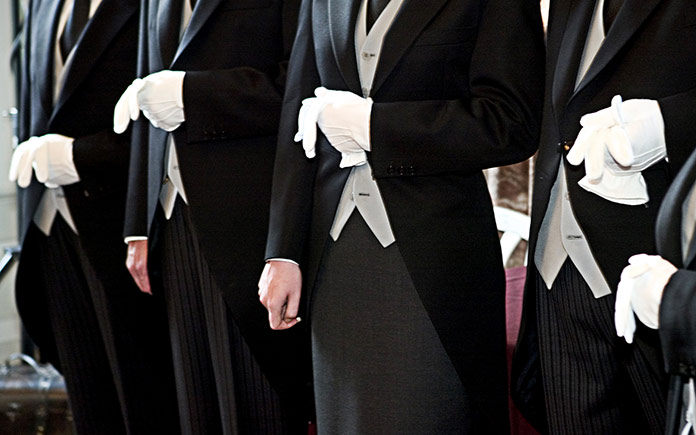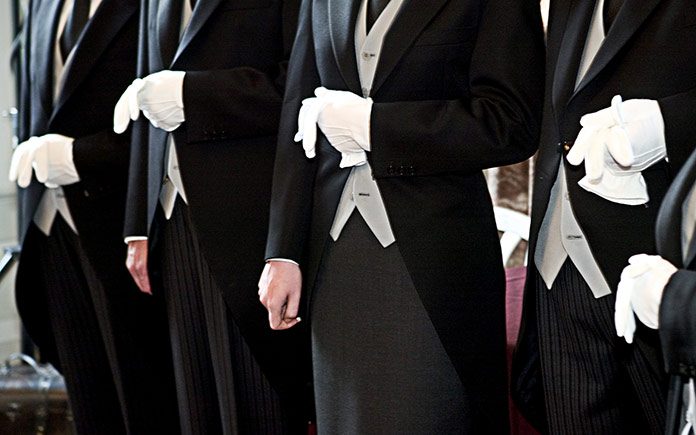 To enter the world of luxury is an aspiration common to people of all backgrounds the world over. However, living a life of ease is about far more than simply the amount of money you have in the bank, or the lavishness of your collection of possessions.
To enter the world of luxury is an aspiration common to people of all backgrounds the world over. However, living a life of ease is about far more than simply the amount of money you have in the bank, or the lavishness of your collection of possessions.
To be truly accepted into the exclusive realms of luxurious living, you need to take on many aspects of the lifestyle which may not be immediately obvious if you were to become rich overnight.
This means following social etiquette when mixing with other affluent people, knowing how to employ domestic help and treat your staff in the proper manner, and also living in a way that involves more than simply doing the social rounds of polite society. Those raised in moneyed families will know how to conduct themselves almost instinctively, but for newcomers to wealth and privilege, it pays to be a little prepared if you want to blend in.
Social Etiquette
Etiquette is the foundation of luxury society. A person of means has the time and inclination to behave properly in social settings. While many of the more arcane, arbitrary rules of times past are now out of favor, an overall standard of correct behavior is a sure way of discerning the true status of an individual, far more so than any ostentatious displays of wealth.
An extremely important point to note is that in today’s global high society, wealth and luxury are enjoyed by people of all backgrounds and all cultures. Different societies have particular rules and traditions, and these aren’t always transferable across the boundaries of national heritages.
This means that intricate rules of etiquette and protocol are not as widely observed as they once were, and while you should be aware of the social mores of the company you keep, it’s your overall demeanor that matters. Here are just some of the standards expected in polite, affluent society.
Money and wealth is not, in itself, a proper subject of conversation. By all means discuss money in terms of business or economics, but personal wealth is exactly that – personal and private. Rich people constantly come up against others looking to take a share, and showing an undue interest in money could – unfairly or not – mark you out as a potential ‘gold digger’.
While it’s polite to admire and remark on a person’s dress, jewelry, or other facets of their appearance, it is extremely crass to ask how much was paid for a costume, or where it came from. Likewise, a luxury car can be an interesting conversation point, but avoid discussing prices, running costs, and so on. These aren’t particularly important considerations for the truly rich.
Unless the situation demands it, the topics of religion and politics should be avoided, as they tend to be highly divisive subjects which arouse strong feelings, and can easily lead to unnecessary conflict.
There’s no need to brag about your own wealth or your connections to important people. In luxury circles, these qualities are assumed, and trying to impress will only undermine your efforts to be taken seriously. The same goes for overly-opulent jewelry or clothing: true class is quietly confident, and not brash.
Above all remember that most of the rules of fussy etiquette, such as strict protocols at the dining table, for example, are no longer in vogue for the luxury elite. Trying to adhere to outmoded conventions developed in previous centuries will tend to set you apart from those for whom proper deportment is ingrained. Indeed, being a stickler for formal etiquette, and especially pointing out others’ transgressions, is usually seen as highly inappropriate behavior.
Staff and Help
It’s not just behavior in social settings that distinguishes a person who’s comfortable with the luxury lifestyle, but also the employment of domestic staff and the way in which they’re treated. There are many kinds of help which an affluent person can employ. However, no matter the role of your staff, certain standards should be met in the way you interact with them.
All staff should be treated with full and proper respect. Nothing shows up an arriviste more than a condescending or rude manner towards those in their employ. Wealthy people should be secure in their privilege, and don’t need conspicuously to treat others as underlings in order to feel important.
Nonetheless, the relationship should be kept on a professional footing. Civil conversation and pleasantries are fully appropriate, but personal matters should be avoided.
Your staff are not your slaves. It’s a sign of respect and class to observe at least a minimum level of tidiness and organization, rather than relying on staff to take care of every detail in your wake.
There’s an almost unlimited number of roles to which wealthy people can employ help, including the following.
Butler
A butler is traditionally a higher-level member of staff in a larger household. The role involves managing all aspects of the running of the residence, although with particular emphasis on the dining room, wine cellar, and kitchen. Modern butlers can take on a variety of other roles, including chauffeur, and even in today’s enlightened society a butler is almost always male.
Housekeeper
A housekeeper is the traditionally female equivalent of a butler, and is responsible for all aspects of household management, including cleaning, laundry, errands, supplies, and occasional cooking.
Maternity and Childcare
Whether it be looking after a newborn infant or providing out-of-school care for older children, a dependable nanny or other childminder is one of the most essential types of help for affluent families. This is a role traditionally filled by females, and is often a live-in position in moneyed households.
Private Chef
Although being wealthy opens the doors to the world’s greatest restaurants, constant fine dining can lead to jadedness. However, employing a private chef will ensure that high-level dining can be enjoyed at home, whether at family mealtimes or when entertaining.
Security
Wherever there’s wealth, there’s a requirement for security. Whether it be for personal safety or protection of property, many highly affluent people hire staff to provide security.
Groundskeeping and General Maintenance
In larger residences, especially those with land, there is usually a role for someone to oversee maintenance of the property and its grounds. This job can include or cross over with that of a gardener, or in smaller houses it can be combined with the job of a butler.
Domestic Couples
This is a highly traditional type of staff employment, where a married couple live on the premises and take on all aspects of household management. The roles of butler and housekeeper will be combined with those of gardener, maintenance, security, and any other duties that may be required.
Personal Assistants
Lastly, a life of luxury doesn’t often mean a life of idleness. Just as in business, having someone in charge of appointments, transportation, and all the other details of daily life is a vital part of the prosperous lifestyle. A personal assistant may have responsibilities for both personal and business arrangements, and a competent PA will ensure that all aspects of the employer’s diary run smoothly. The butler can also be the personal assistant.
Living The Luxury Lifestyle
The popular image of a life of luxury is one of cocktails on a tropical beach or by the superyacht pool; a life spent mingling and schmoozing with other members of high society. However, in reality, the luxury life tends to be a little busier. While younger people may be happy simply to enjoy the social whirl, more mature members of wealthy society usually find something a little more constructive to do with their time.
A successful business career is, of course, a highly respectable lifestyle choice for affluent people, but charity work and philanthropy is also highly popular and honorable. It’s not expected that people of means should be workaholics, but by the same token an idle lifestyle is often viewed with suspicion. Wealthy people are usually aware of their privilege, and grateful for it, and largely desire to use their advantages to the benefit of their families or wider society.
By its very exclusive nature, the luxury life is not one into which many people are born, and if you’re fortunate enough to attain such status then it can be difficult to become a fully accepted member of the club. However, there’s nothing intrinsically closed about luxury society, and taking on proper standards of behavior and lifestyle will go a long way towards gaining acceptance to this most rarefied of groups.













